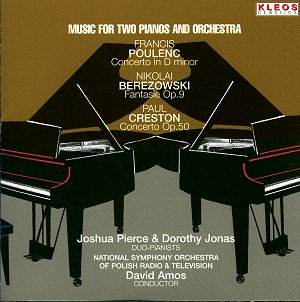In prospect this made a fascinating collection. Having
heard the disc I am not sure it works as a play-through recital. There
is something a unremittingly insistent about the results produced by
these composers when faced with the challenge of writing a work for
two pianos and orchestra.
The Poulenc is the best known of the concertos. It
wears its brightness well. The sound is brilliant but not particularly
rich. The ricocheting dialogue of the outer movements is unrelieved.
This is not top drawer Poulenc although the middle movement is very
close to the composer’s best with an effect similar to the reflective
reveries of Mozart's Piano Concerto No. 24.
The Berezowsky Fantasie resembles Prokofiev in its
shatter-bright energy although it is a bit anonymous overall. I found
it difficult get a handle on this work; not that the language is obtuse
(nor is it for any of the works on this disc). It certainly is not short
in the brilliance department. Berezowsky was born in St Petersburg,
emigrated to the USA in 1922, played violin with the New York SO and
then with the Coolidge Quartet. 1931 was also the year of Berezowsky’s
first symphony (there were to be four between 1931 and 1943) and his
only violin concerto.
The Creston is excellent. A bit of an unrelenting ‘thrash’
(and this is not a criticism of the soloists) in the outer movements
but the central section is one of Creston's finest inspirations. The
material can stand happily in the company of the Second and Third Symphonies.
The disc is particularly valuable to explorers of the
repertoire but compelling for the central movements of both the Poulenc
and the Creston. We are not over-blessed with Creston recordings so
those who have discovered his orchestral music through the Naxos, Koch
and Delos labels will naturally want to seek this out. They may however
have wished for an all-Creston disc rather than a recital mixed with
other voices.
Delightful work from everyone and especially for the
swashbuckling and sensitive Jonas and Pierce.
Rob Barnett
